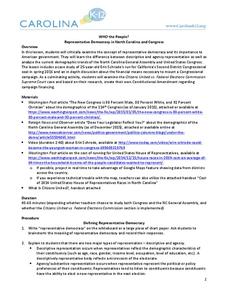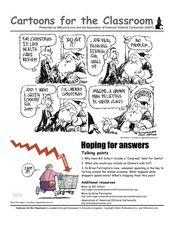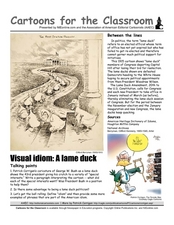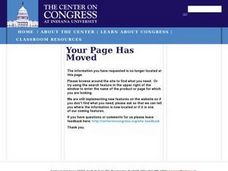Stanford University
Iraq Resolution
The 9/11 attacks propelled the United States into a period of low-grade war that has existed from that day all the way to current times. By looking at documents from the decision to send troops to Iraq in 2006, scholars connect the...
Alabama Department of Archives and History
An African American Represents Alabama during Reconstruction
The era after the Civil War saw a flourishing of African Americans exercising their rights. Using graphic organizers and Internet research, pupils consider the legacy of Benjamin Sterling Turner, who sat in Congress. Afterward, they...
iCivics
LawCraft
What's it like to be a senator or member of the House of Representatives? Using a video game simulation, learners discover what it is like to craft and pass legislation from its idea through conference committee. Pop ups and annotation...
Carolina K-12
African Americans in the United States Congress During Reconstruction
The Civil Rights Act of 1866, which granted citizenship to all males in the U.S., resulted in the first African Americans to be elected to Congress. Class members research 11 of these men, the challenges they faced, and craft...
College Board
2015 AP® Human Geography Free-Response Questions
How are population and political power related? What is the significance of the globalization of English? Why do refugees leave their home countries? Using structured short-answer questions, scholars unravel complicated dynamics with...
US House of Representatives
Objects in Time
What is the role artifacts play in the study of past events and people? As part of an examination of the careers and contributions of women in Congress from 1917 to 2006, groups examine artifacts that symbolize each woman.
iCivics
Mini-Lesson: Veto Power
No means no! Scholars analyze the impact of one of the president's most powerful tools—the veto—while also finding out ways to properly check facts for validity. They research the power of the presidential veto with paired activities and...
iCivics
Mini-Lesson: Gerrymandering
Who determines the structure of voting districts? The concept of gerrymandering brings to light the ongoing issue of how those running for office gain votes. Hands-on activities enable scholars to analyze the re-drawing of voting...
iCivics
Mini-Lesson: The Incumbent Advantage
Does the person running for re-election have an advantage over the challenger? Scholars explore the concept of incumbent advantage during elections using an informative mini-lesson explaining the legislative branch. In pairs, they...
iCivics
Mini-Lesson: Filibusters
How long can you speak without stopping? Scholars analyze the concept of a filibuster in the United States Senate using an installment of the Legislative Branch series of mini-lessons. They research recent filibuster attempts in the...
iCivics
Mini-Lesson: Congressional Committees
How exactly do both houses of Congress come to a formal decision on an issue? Scholars research the use of congressional committees as part of the legislative process. By using current events to analyze information, they see the role...
Heritage Foundation
Congress's Economic Powers
Join Congress as they assess their economic abilities for spending—and as they discover their limits. High schoolers use an educational resource to explore Congress's economic powers and learn to apply these concepts to their everyday...
National Endowment for the Humanities
Lesson 2 James Madison: The Second National Bank—Powers Not Specified in the Constitution
How much power is too much power for the federal government? Scholars use primary documents and constitutional research in groups to analyze the creation of the Second National Bank under James Madison. This is the second lesson plan of...
Carolina K-12
Who the People? Representative Democracy in North Carolina and Congress
Our elected officials are supposed to represent us, but what does it mean when they aren't like us? Budding citizens explore the demographic makeup of the US Congress, the role of money in political elections, and the Citizens United...
iCivics
Why Do We Have a House and Senate, Anyway?
Why does the United States have a bicameral voting system? Through role playing as either advocates for or against a cell phone policy in school, your learners will organize, vote, compromise, and experience first-hand the benefits of a...
Curated OER
How Laws Are Made
Learners create a graphic organizer to illustrate the steps elected representatives must take to make a new law. Included: Student work sheet and role-play ideas. Students use their graphic organizers to write a paragraph briefly...
Curated OER
The Legacy of Ancient Greece and Rome
Where did the inspiration for the US government system come from? From the ancient Greeks and Romans, of course. Scholars define nine terms relating to Greek and Roman government, complete a graphic organizer, and list the greatest...
Curated OER
Simplified United States Constitution and Bill of Rights
A good handout is a great find. Print this resource and hand out a simplified version of the US Constitution and Bill of Rights to your US government or US history class. The powers of the president, Congress, and the Senate are...
Curated OER
Cartoons for the Classroom: Congress and the President
Learners take a critical look at the ways in which the president interacts with Congress in order to make political and economic decisions. They use a series of well-constructed discussion questions to guide their thinking as they...
Curated OER
Cartoons for the Classroom: Joseph Wilson Accuses the President
Get a fun discussion going with this current events worksheet, which has scholars analyzing 2 political cartoons about an incident in 2009, when Congressman Joseph Wilson accused President Barack Obama of lying during a speech....
Curated OER
Cartoons for The Classroom: Lame Duck Congress
Clear up "lame duck" congressional confusion with this political cartoon analysis instructional activity. Background information on the concept's history and current use is provided, and 2 cartoons give a past and present context. Three...
Curated OER
Cartoons for the Classroom: 2012 Mid-Term Elections
Use a political cartoon to help scholars grasp the significant turnover in Congress following the 2012 mid-term election. A Mike Keefe cartoon uses symbols and current political lingo to convey perspective on the issue, and background...
Curated OER
How to Become a Member of Congress
Young scholars identify requirements for becoming a U.S. Representative or a U.S. Senator, explain procedure for running for representative or senator, and create an informational brochure.
Curated OER
Express Your Opinion
Students explore local, state, and national levels of government and discuss which level of government they should contact to get information, express their opinions, or get help on specific issues.

























